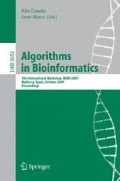Abstract
We propose and study the Maximum Constrained Agreement Subtree (MCAST) problem, which is a variant of the classical Maximum Agreement Subtree (MAST) problem. Our problem allows users to apply their domain knowledge to control the construction of the agreement subtrees in order to get better results. We show that the MCAST problem can be reduced to the MAST problem efficiently and thus we have algorithms for MCAST with running times matching the fastest known algorithms for MAST.
Access this chapter
Tax calculation will be finalised at checkout
Purchases are for personal use only
Preview
Unable to display preview. Download preview PDF.
References
Amenta, K., Clarke, F.: A linear-time majority tree algorithm. In: Proceedings of the 3rd International Workshop on Algorithms in Bioinformatics, pp. 216–227 (2003)
Berger-Wolf, T.Y.: Online consensus and agreement of phylogenetic trees. In: Proceedings of the 4th International Workshop on Algorithms in Bioinformatics, pp. 350–361 (2004)
Berry, V.: Improving the reduction from the constrained to the unconstrained MAST. Technical Report 05041, LIRMM (2005)
Cole, R., Farach, M., Hariharan, R., Przytycka, T., Thorup, M.: An O(nlogn) algorithm for the maximum agreement subtree problem for binary trees. SIAM Journal on Computing 30(5), 1385–1404 (2000)
Dong, S., Kraemer, E.: Calculation, visualization and manipulation of masts (maximum agreement subtrees. In: Proceedings of the IEEE Computational Systems Bioinformatics Conference, pp. 1–10 (2004)
Farach, M., Thorup, M.: Optimal evolutionary tree comparison by sparse dynamic programming. In: Proceedings of the 35th Annual IEEE Symposium on Foundations of Computer Science, pp. 770–779 (1994)
Farach, M., Thorup, M.: Fast comparison of evolutionary trees. In: Proceedings of the 5th Annual ACM-SIAM Symposium on Discrete Algorithms, pp. 481–488 (1995)
Hardy, G.H., Littlewood, J.E., Pólya, G.: Inequalities. Cambridge (1952)
Kao, M.Y.: Tree contractions and evolutionary trees. SIAM Journal on Computing 27, 1592–1616 (1998)
Kao, M.Y., Lam, T.W., Sung, W.K., Ting, H.F.: A decomposition theorem for maximum weight bipartite matchings with applications in evolution trees. In: Proceedings of the 7th Annual European Symposium on Algorithms, pp. 438–449 (1999)
Kao, M.Y., Lam, T.W., Sung, W.K., Ting, H.F.: An even faster and more unifying algorithm comparing trees via unbalanced bipartite matchings. Journal of Algorithms 20(2), 212–233 (2001)
Keselman, D., Amir, A.: Maximum agreement subtree in a set of evolutionary trees– metrics and efficient algorithms. In: Proceedings of 35th Annual Symposium on the Foundations of Computer Sciences, pp. 758–769 (1994)
Kubicka, E., Kubicki, G., McMorris, F.: An algorithm to find agreement subtrees. Journal of Classification 12, 91–99 (1995)
Messmark, A., Jansson, J., Lingas, A., Lundell, E.: Polynomial-time algorithms for the ordered maximum agreement subtree problem. In: Proceedings of the 15th Annual Symposium on Combinatorial Pattern Matching, pp. 220–229 (2004)
Peng, Z.S., Ting, H.F.: An O(n logn)-time algorithm for the maximum constrained agreement subtree problem for binary trees. In: Proceedings of the 15th symposium on Algorithms and Computations, pp. 754–765 (2004)
Przytycka, T.: Sparse dynamic programming for maximum agreement subtree problem. In: Mathematical Hierarchies and Biology. DIMACS series in Discrete Mathematics and Theoretical Computer Science, pp. 249–264 (1997)
Steel, M., Warnow, T.: Kaikoura tree theorems: computing the maximum agreement subtree. Information Processing Letters 48(2), 77–82 (1994)
Author information
Authors and Affiliations
Editor information
Editors and Affiliations
Rights and permissions
Copyright information
© 2005 Springer-Verlag Berlin Heidelberg
About this paper
Cite this paper
Peng, Z.S., Ting, H.F. (2005). An Efficient Reduction from Constrained to Unconstrained Maximum Agreement Subtree. In: Casadio, R., Myers, G. (eds) Algorithms in Bioinformatics. WABI 2005. Lecture Notes in Computer Science(), vol 3692. Springer, Berlin, Heidelberg. https://doi.org/10.1007/11557067_9
Download citation
DOI: https://doi.org/10.1007/11557067_9
Publisher Name: Springer, Berlin, Heidelberg
Print ISBN: 978-3-540-29008-7
Online ISBN: 978-3-540-31812-5
eBook Packages: Computer ScienceComputer Science (R0)

